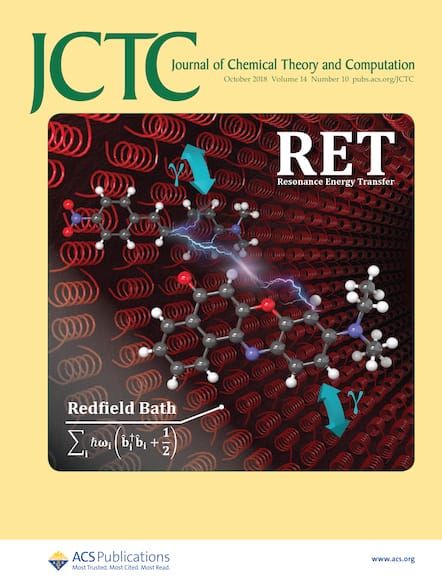通过 PCS/DDCI/MC-PDFT 协议协调无障碍反应步骤的准确性和可行性:甲烷和乙烯解离案例研究
IF 5.5
1区 化学
Q2 CHEMISTRY, PHYSICAL
引用次数: 0
摘要
在可变反应坐标变分过渡态理论的框架内,对处理无障碍反应步骤的最先进计算协议进行了多项改进。第一步是迭代差分专用构型相互作用(I-DDCI)和比萨复合方案的协同集成,它定义了一个成本更低但非常精确的计算工作流程。这种方法为获取一维参考电势提供了近乎黑箱的工具。然后,利用动态调整哈特里-福克交换的多配置对密度泛函理论(MC-PDFT),设计出一种通用策略,用于调整蒙特卡罗(MC)采样中使用的理论水平。同时,MC 模拟期间的部分几何优化考虑了反应坐标和保守模式之间的耦合。该协议非常接近全尺寸一致性,并产生了高度精确的结果,一些测试计算表明,I-DDCI 修正与基集尺寸的收敛速度很快。两个案例研究(CH4 和 C2H4 的氢解离)说明了新平台的能力,突出了其处理不同碳杂化(sp3 和 sp2)的灵活性。计算出的速率常数非常准确,这证实了所提出方法的稳健性。这些结果及其固有的趣味性,为专家和非专业人员通过可靠、用户友好的工具系统研究复杂气相反应铺平了道路。本文章由计算机程序翻译,如有差异,请以英文原文为准。

Reconciling Accuracy and Feasibility for Barrierless Reaction Steps by the PCS/DDCI/MC-PDFT Protocol: Methane and Ethylene Dissociations as Case Studies
Several enhancements have been introduced into state-of-the-art computational protocols for the treatment of barrierless reaction steps in the framework of variable reaction coordinate variational transition state theory. The first step is the synergistic integration of the Iterative Difference Dedicated Configuration Interaction (I-DDCI) and Pisa Composite Scheme, which defines a reduced cost, yet very accurate, computational workflow. This approach provides a near black box tool for obtaining 1D reference potentials. Then, a general strategy has been devised for tuning the level of theory used in Monte Carlo (MC) sampling, employing Multiconfiguration Pair Density Functional Theory (MC-PDFT) with dynamically adjusted Hartree–Fock exchange. Concurrently, partial geometry optimizations during the MC simulations account for the coupling between the reaction coordinates and conserved modes. The protocol closely approaches full size consistency and yields highly accurate results, with several test computations suggesting rapid convergence of the I-DDCI correction with the basis set dimensions. The capabilities of the new platform are illustrated by two case studies (the hydrogen dissociation from CH4 and C2H4), which highlight its flexibility in handling different carbon hybridizations (sp3 and sp2). The remarkable accuracy of the computed rate constants confirms the robustness of the proposed method. Together with their intrinsic interest, these results pave the way for systematic investigations of complex gas-phase reactions through a reliable, user-friendly tool accessible to specialists and nonspecialists alike.
求助全文
通过发布文献求助,成功后即可免费获取论文全文。
去求助
来源期刊

Journal of Chemical Theory and Computation
化学-物理:原子、分子和化学物理
CiteScore
9.90
自引率
16.40%
发文量
568
审稿时长
1 months
期刊介绍:
The Journal of Chemical Theory and Computation invites new and original contributions with the understanding that, if accepted, they will not be published elsewhere. Papers reporting new theories, methodology, and/or important applications in quantum electronic structure, molecular dynamics, and statistical mechanics are appropriate for submission to this Journal. Specific topics include advances in or applications of ab initio quantum mechanics, density functional theory, design and properties of new materials, surface science, Monte Carlo simulations, solvation models, QM/MM calculations, biomolecular structure prediction, and molecular dynamics in the broadest sense including gas-phase dynamics, ab initio dynamics, biomolecular dynamics, and protein folding. The Journal does not consider papers that are straightforward applications of known methods including DFT and molecular dynamics. The Journal favors submissions that include advances in theory or methodology with applications to compelling problems.
 求助内容:
求助内容: 应助结果提醒方式:
应助结果提醒方式:


